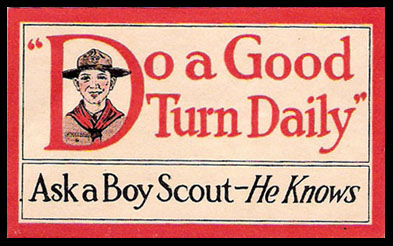
For almost 100 years, Scouting programs have instilled in youth the values found in the Scout Oath and Scout Law. Today, these values are just as relevant in helping youth grow to their full potential as they were in 1910. Scouting helps youth develop academic skills, self-confidence, ethics, leadership skills, and citizenship skills that influence their adult lives.
AIMS OF SCOUTING
All Programs in Scouting Works Toward the Same Three Aims.
1. Character Development
2. Citizenship Training
3. Mental & Physical Fitness

The Methods of Scouting.
1. The Ideas
The ideas of the Boy Scouts Of America are spelled out in the Scout Oath, Scout Law, Scout Motto, and Scout Slogan. Boy Scouts and Adult Leaders incorporating these ideas into their daily lives Are said to have Scout spirit.,
2. The Patrol Method.
Within a larger community of the troop, the patrol is a Scout's "family circle." Often made up of boys who are close in age and experience level, each patrol helps its members develop a sense of pride and identity. The boys elect their patrol leader, divide up the jobs to be done and share in the satisfaction of accepting and fulfilling group responsibilities.
3. The Outdoors
Boys join Scouting for the challenge, the excitement, and the fun. Much of Scouting is designed to take place outdoors in settings where boys can find real adventure.
4. Advancement
The Boy Scouts of America believes that a boy should receive recognition for his achievements. Earing merit badges allows boys to explore many fields, helps them round out their skills, and perhaps introduce them to subjects that will become lifelong interests and rewarding careers. As one of the eight methods of Scouting, advancement is a natural outcome of the other seven.

5. Association With Adults
Boys learn a great deal by watching adults conduct themselves. Scout leaders can be positive role models for the members of the troop.
6. Personal Growth
Scout-age boys are experiencing dramatic physical and emotional growth.
Scouting offers them opportunities to channel much of that change into productive endeavors and to find the answers they are seeking for many of their questions. Through service projects and Good Turns, Scouts can discover their place in their community. The religious emblems program offers pathways for Scouts to more deeply understand their place in the world. The troop itself? Provides each Scout with an arena in which to explore, to try out new ideas, and sometimes simply embark on adventures with no design other than having a good time with good people.
7. Leadership Development
Leadership is a skill that can be learned only by doing it. Every boy in a patrol and troop will find that he is filling leadership positions of increasing responsibility. Through leadership experiences, boys learn planning, organization, and decision making. For many boys, accepting the role of patrol? Leader is the first real Add to dictionary they ever had. Discovering that they can do the job will go a long way toward giving them the confidence and ability to be leaders in the future.
8. The Uniform
Since 1910, the Boy Scout uniform has been an recognizable part of the American scene. Wearing the uniform help boys develop a sense of belonging to their patrol and troop. It reinforces the fact that all members of the BSA are equal to one another. People seeing a boy in a Scout uniform expect someone of good character who is prepared to the best of his ability to help those around him.